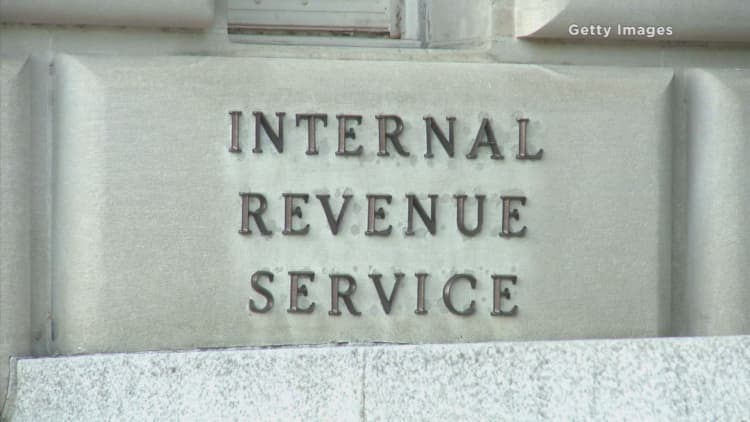If you're trying to avoid filing a return and paying the taxes you owe, forget about claiming that the Constitution protects your right to do so.
You can also forget about asserting that the IRS isn't an agency of the United States.
These arguments are just two of the excuses tax dodgers love to dole out this time of year as reasons why they don't have to submit a return and cough up levies.
You're running out of time to turn in that Form 1040 and pay what you owe, by the way: Tax Day is April 18.
As of March 24, the IRS received 85.3 million individual income tax returns, down 4.7 percent from the year-ago period.
For your convenience, the IRS created a list of common frivolous tax arguments that would-be tax skippers concoct around filing time.
The agency has also spotlighted fishy tax shelters, schemes built by promoters to fool wealthy taxpayers into thinking they can outsmart the IRS.
"These scams can end up costing taxpayers more in penalties, back taxes and interest than they saved in the first place," IRS Commissioner John Koskinen said.
The Constitution as a tax dodge
Ambitious tax evaders point to the Constitution as a reason why they can avoid coughing up their fair share.
For instance, some taxpayers claim they don't have to file a return because the Fifth Amendment protects them from self-incrimination.
Here's the surprise: The Supreme Court deflated this argument in 1927 in United States v. Sullivan, asserting that this claim would press the protection of the Fifth Amendment "too far."
The IRS has issued a bulletin against constitutionally based arguments, threatening penalties and the possibility of prison for these attempts.
'Voluntary' tax payments
Others have tried to assert that filing a return and paying the federal income tax are voluntary actions.
What's "voluntary" about our tax system is that taxpayers are permitted initially to figure out the amount of taxes they owe and complete the returns, as opposed to having the government do that for them, according to the IRS.
Payment of taxes isn't an option, however. The IRS points to Section 1 of the Internal Revenue Code, which imposes levies on taxable income.
There is something about taxes that turns the brains of smart and sophisticated people into mush.Ed SlottCPA and founder of Ed Slott and Company
Other whoppers include, "I don't owe federal income taxes because I'm a citizen of my state and not the United States," "I owe no income taxes because I've filed a return that reports no income and no liability" and "wages I've received for personal services don't count as income."
The IRS has debunked all of these.
Indeed, you can complain about the tax code, but you still have to abide by it.
"The biggest complaint I see in general about our tax system is income that is earned is taxed as ordinary income, while investment income gets beneficial tax treatment," said Debbie J. Freeman, director of tax and financial planning at Peak Financial Advisors in Denver.
Grumbling aside, her clients still file and pay what they owe.
Too good to be true
Some professionals have sought creative ways to try to beat the IRS at its own game through the creation of abusive tax shelters.
This year, the IRS called out micro-captive insurance tax shelters, in which a promoter helps the owner of a business build a small "captive" insurance company in a bid to avoid taxes.
Roth IRA tax-evasion scams are another favorite among the unscrupulous.
In this case, a promoter might suggest that a small business owner open a Roth IRA and transfer ownership of the company to the account.

This is predicated on the idea that if business profits are funneled through the Roth, they will be tax free, said CPA Ed Slott, founder of Ed Slott and Company in Rockville Centre, New York.
Under normal circumstances, withdrawals from a Roth IRA are generally tax free, but that's because you paid income taxes on what you contributed.
Roth IRA tax evasion schemes tend to fall flat because the business owner ends up over-funding the account beyond the annual contribution limit ($5,500 in 2017, plus $1,000 if you're over age 50), which leaves him or her on the hook for taxes and penalties.
Ed Slott's five warning signs about tax schemes
Multiple entities: A tax plan that requires you to set up multiple partnerships to cover up the transaction is probably not going to pass muster with the IRS.
Long professional opinions: A proposed transaction that can't be explained in a paragraph or two should be avoided. If it's too long, it's going to be harder to understand.
Secret formula: Your tax guru is so clever that the investment strategy involved must be kept secret from you. Run away from any deal that requires you to sign a confidentiality agreement stating you won't discuss the transaction.
Unrealistic claims: Be suspicious of ads that tout guaranteed investment returns or that you'll never lose money.
The IRS "approves" this investment: This is blatantly false, as the IRS has a publication stating it does not approve IRA investments.
Be prepared to lose in Tax Court if you challenge the IRS.
In one notable case in 2008, an investor paid a $120,000 fee for an elaborate scheme that resulted in the transfer of about $1.3 million to a Roth IRA without any taxes paid.
The Tax Court ruled in favor of the IRS. The investor "should have realized that the deal was too good to be true," the Tax Court said.
"There is something about taxes that turns the brains of smart and sophisticated people into mush," Slott said. "These are people who won't spend 2 more cents on coffee, but they'll spend thousands on something that's supposedly tax free."






